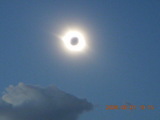


|

|
I have stories of previous eclipse trips to (1) Aruba, (2) Hungary, (3) Zambia, and (4) Australia, and (5) Libya. The third was on my own with a side trip to Victoria Falls and the last combined Africa with the middle east, plenty of stories to tell. Just think how much there will be to tell about a trip to the heart of the dragon. It's going to be like another chapter of Holidays in Hell by P. J. O'Rourke.
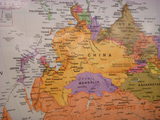
|
|
|
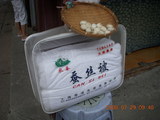
|
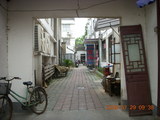
|
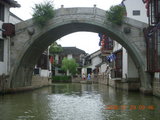
|
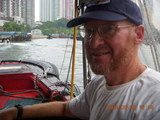
|
I feel like Andy Rooney is going to make fun of me. He did a bit on "Sixty Minutes" where he said people always complain about bad news on television and did a brief "news show" with nothing but good news. He showed a flight where nothing went wrong, a hotel safe where nothing was stolen, and a small town on the Mississippi River that did not get flooded. Well, maybe my trip went smoothly (thanks to Explorers) but I still saw some wonderful and amazing things in China, the land of the dragon.
If you're planning a trip to China, then there should be some good tips in here. If not, then you can share the trip and enjoy my pictures without any harrowing stories of near death experiences. Here's the outline of my story:
Planning the Trip Documents and Stuff Medical Stuff Bugs and Stuff Internet Stuff Running every morning Shanghai 2008 July 26 - PHX to SFO to PVG 2008 July 27 - Dinner 2008 July 28 - Bund 2008 July 28 - Jade Buddha Temple 2008 July 28 - Pearl Factory 2008 July 28 - Nanjing Road shopping 2008 July 28 - Night Boat Ride in Shanghai Harbor 2008 July 29 - Zhu Jia Jiao Fishing Village 2008 July 29 - Silk Factory 2008 July 29 - Yuyuan Garden 2008 July 29 - Maglev Train 2008 July 29 - Acrobats Jiayuguan and Jiaquan 2008 July 30 - PVG to XIY to JGN 2008 July 31 - Local Park Tour in Jiuquan 2008 July 31 - Luminous (Jade) Cup factory 2008 July 31 - Great Wall Eclipse in the Gobi Desert 2008 August 1 - eclipse Xi'an 2008 August 2 - JGN to XIY (Mandlish) 2008 August 3 - Jade Factory 2008 August 3 - Terra-Cotta Warriors 2008 August 3 - HuaQingChi Hot Springs - Chiang Kai Shek residence Hong Kong 2008 August 4 - Wild Goose Pagoda 2008 August 4 - XIY to HKG 2008 August 4 - Symphony of Lights 2008 August 5 - Victoria Peak 2008 August 5 - Stanley Market and the Wind Surfers 2008 August 5 - Boat Ride in Hong Kong Harbor 2008 August 5 - Jewelry Factory 2008 August 6 - The Journey Home Impressions of the Dragon Capitalism versus Communism Good Hosts versus Xenophobes What I Took Home from China Plans for 2009 July 22 |
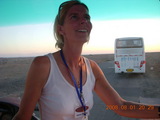
|
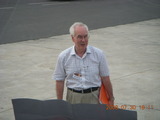
|
Explorers is a London-based tour firm specializing in diving tours and solar-eclipse trips. After braving my own way through Zambia for the 2001 June 21 eclipse, I decided to use a tour group to get to the Australian Outback for the 2002 December 4 eclipse. Even though they're English and I'm American, Explorers sounded right. They came east and I came west and we met in Adelaide. My experience was good enough that I met them in London for their tour to Libya for the 2006 March 29 eclipse and they did really well there. So I figured the third time's a charm and I would let them deal with China.
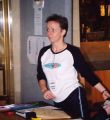
|
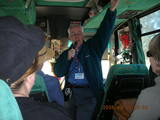
|
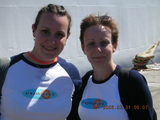
|
I heard that Explorers has been purchased by a larger travel company,
maybe Thomas Cook, maybe somebody else.
Any change is worrisome
when an outfit is as well run as Explorers,
In addition,
I have my own experience when our little company Khimetrics
was bought out by the large software enterprise of SAP.
It wasn't just that SAP didn't understand what Khimetrics was all about,
it wasn't within their scope of attention to try to find out.
I hope whoever buys Explorers leaves them alone
the way China seems to have left Hong Kong alone.
Documents and Stuff

|

|

|

|
Rules are different for mainland China and Hong Kong. I don't think U.S. visitors need a pre-trip visa for Hong Kong, but I would suggest checking with someone more official than me before showing up at the airline departure gate. Going the other way, the web page from InsureMyTrip has the latest scoop on travel visas for visiting the United States.
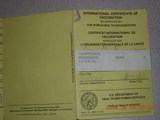
|
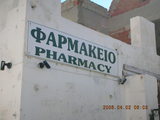
|
Before any long trip, I recommend a visit to a travel doctor. I know I've achieved some sort of frequent-traveler status when the doctor looked at my itinerary and my "yellow card" and said I have all the shots and pills I need. I got the usual warnings about using DEET bug repellent and not drinking tap water. The latter includes keeping my mouth closed in the shower and brushing my teeth in bottled water.
Bugs and Stuff
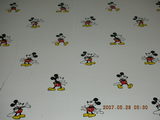
|
One of the things to get used to in Asia, especially Japan I'm told, is that people smoke anywhere and everywhere. As annoying as it is for someone like me who doesn't like cigarette smoke, I can't get too mad. The United States was like that when I grew up. (As I see all this tobacco, probably American grown and exported, I have to wonder whether my country is the net importer or the net exporter of a drug problem.)

|
I got a cute little sub-laptop computer. It came with Linux (no Windows, fewer headaches, no MacIntosh, less cost) but it was some way-out version called Ubuntu where even the "official" releases don't work well and the graphical configuration menus were flaky. (I was hoping Linux would be a role model for Windows and not the other way around. Too bad.) The idea was that I could send my pictures home to my own computer over the Internet rather than count on memory cards with a zillion pictures.
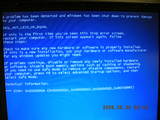
|
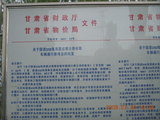
|
Running Every Morning
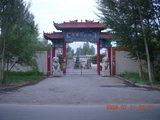
|
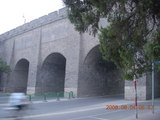
|
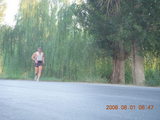
|
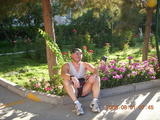
|
It was also kind-of fun being the center of attention. Anybody with my bright-red hair (even with a cap over ever-widening pattern baldness) is going to be noticed, but I definitely was stared at more running in India and China than on the roads at home where freckled legs are less of a novelty. People smiled and waved and I was happy smiling and waving back.
Hong Kong is my seventh country running where they drive on the left side of the road. (There are four left-driving countries I've visited and not run in.) Looking the other way takes some serious getting used to, but it's part of the rhythm of a place.
2008 July 26-27 —
Phoenix (PHX) to San Francisco (SFO) to Shanghai (PVG)
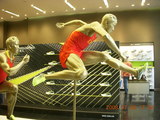
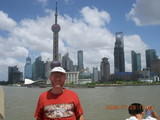
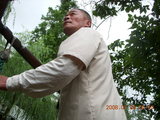
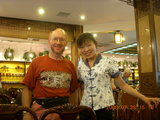
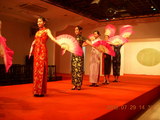
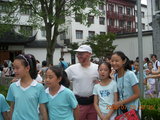
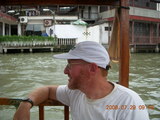
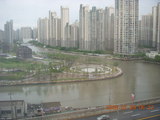
Shanghai
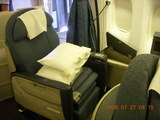
|
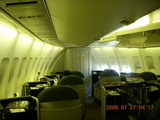
|
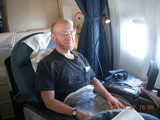
|
2008 July 27 — Dinner
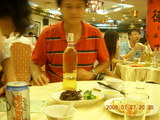
|
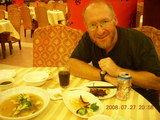
|
A friend of mine was taken to a Chinese feast in Beijing a few years back and it was straight out of Indiana Jones except with spiders instead of bugs. Apparently one company executive was trying to impress other company executives and this was not the usual upper-crust Chinese dining fare.
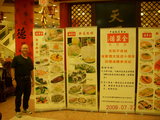
|
Once the other seventeen people arrived in my group,
our meals were generally two tables of nine each
for our group of eighteen people.
We would be served a mix of dishes,
the sort that we think of as Chinese in the United States,
along with rice.
Soup was usually served about halfway through the meal
and the last dish,
the fat lady singing in American proverb,
was always watermelon.
When the sliced watermelon was on the table,
we knew there were no more dishes coming.
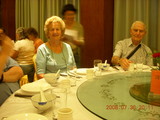
|
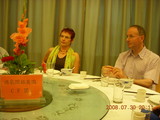
|
When I travel five to seven time zones east overnight, I generally feel lousy. I remember getting through the first feeling-lousy day in Europe when I came from the American midwest and east coast. Now I was fresh and happy from traveling west, much easier, while the Europeans felt like I do when I visit them.
I was delighted with the company of my fellow travelers. They were well traveled, no surprise, well read, and well spoken. These were people whose conversation I enjoyed, when they could get past my American accent.
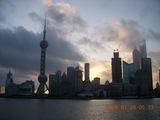
|
Even daybreak was a busy time at the bund with walkers and even a few joggers amidst the kite fliers and those enjoying the view. I was surprised how many had cameras. (Were they all tourists? At that hour?) The entire stretch is about 1500 meters (not quite a mile) so I wouldn't plan a long run here and even a shorter distance run involved repeating the route.
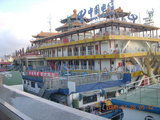
|
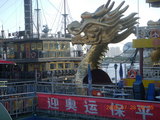
|
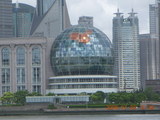
|
Third, we took an evening boat ride in the harbor. This was a very nice way to experience Shanghai's skyline. Some of us sat down in the drinks-required section to find ourselves charged RMB 15 (two dollars) for a can of Sprite soda pop, not too bad a deal for being able to sit comfortably for the entire boat ride.
2008 July 28 — Jade Buddha Temple
A trip to a major Chinese city is made more complete by exposure to China's most popular religion. This temple has two large Buddha statues make of white jade. Within its city block, the temple hides a serene atmosphere and classical Chinese architectural style.
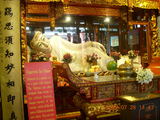
|
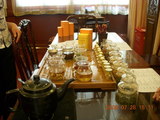
|
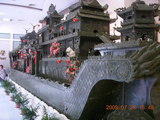
|
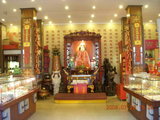
|
2008 July 28 — Pearl Factory
Our next stop was a pearl factory. Actually, the oysters make the pearls and the people cultivate the oysters. In addition to some lovely displays of oysters, clams, and coral, they also had a gigantic jade boat several meters long.
2008 July 28 — Nanjing Road Shopping District
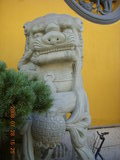
|
There were fake-Rolex-watch salesmen who followed me the entire time I was shopping on Nanjing Road. I ducked into three stores to escape them and they wouldn't let me alone, trying to guide me into allays to buy watches. They were very annoying.
2008 July 28 — Night Boat Ride in Shanghai Harbor
As I said earlier our guide Jacky took us to the Bund again for an evening boat ride in the harbor. The buildings were well lit and several of them had full-size animation in their lighting.
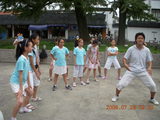
|
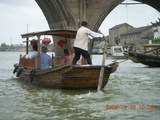
|
Jacky took us on a wonderful outing into a more relaxed area about an hour outside Shanghai through pleasant countryside. The village with its network of canals was built centuries ago (they say). When we got there, Jacky had us do some simple Tai Chi where we were joined by a group of young, blue-shirted girls whose smiles were bright enough to make up for the cloudy skies.
We had a human-powered boat ride through the canals under old bridges past houses and Chinese pagoda-shaped buildings. There were lots of wooden boats in the canals and smiling local people.
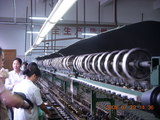
|
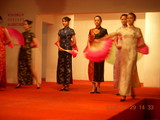
|
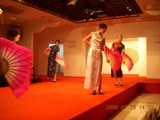
|
2008 July 29 — Silk Factory
Silk comes from silkworms. We were shown silkworms and moths and then a fashion show with beautiful women wearing lovely silk outfits. Then we were shown how they stretch the single and double cocoons into silk sheets that become bedding and clothing. We were given ample opportunity to buy real silk things that were quite a bit more expensive than my fake-silk dragon shirt.
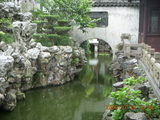
|
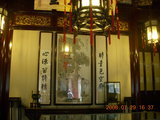
|
In the back of an outdoor shopping center is a delightful oriental garden of manmade streams and rocks and pagoda-shaped buildings. We enjoyed the quiet and tranquility.
2008 July 29 — Maglev Train
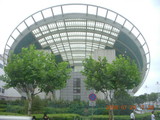
|
2008 July 29 — Acrobats
Our final adventure in Shanghai was an acrobatic show, perhaps in the tradition of the Peking Acrobats I have seen twice in the United States. It was a spectacular show with serious acrobatics mixed with dance and fun.
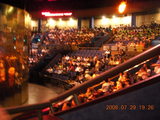
|
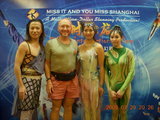
|
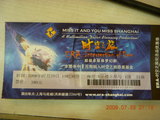
|
Shanghai traffic is awful, sometimes bad, sometimes worse, so dinner had to be after the show. They have brightly illuminated traffic maps over the highways showing roads in green, yellow, and red to indicate congestion. As we sat in an endless line of red tail lights, I remember a line from the movie "Anna and the King of Siam" where one fellow says of a chain of elephants ahead of him, "Unless you're the lead elephant, the view is always the same." There is no lead elephant in heavy traffic.
2008 July 30 —
Shanghai (PVG) to Xi'an (XIY) to Jiayuguan (JGN)
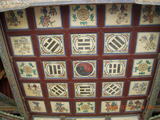
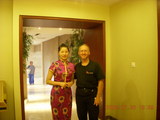
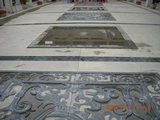
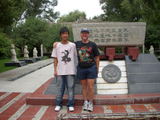
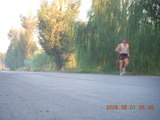
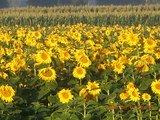
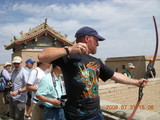
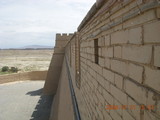
Jiayuguan and Jiuquan
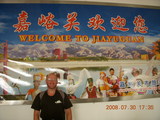
|
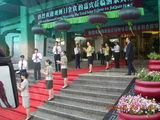
|
The safety announcements were in Chinese with English subtitles and sign language in the corner. There were first-class seats in the front of our narrow-body jets and our flights had full meal service and drinks even in coach class.
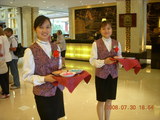
|
Our guide for these three days was Jenny whose English was good enough to guide us for three days. The people at the Jiu Quan Hotel were wonderful, ushered us in with a VIP welcome, and spoke little English, so I was happy to have Jenny to ask questions. It seemed strange to have a first-class-resort hotel in the middle of nowhere. I guess this facility was used for corporate retreats from the eastern-seacoast cities.
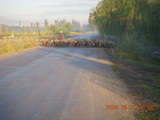
|
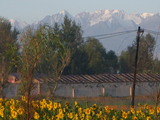
|
Jiuquan, a town of 200 thousand, was far-and-away the nicest running environment I had in China. 2 Km (1.2 miles) took me through the sleeping town, the next 2 Km took me through a commercial and residential area, and I was in green farmland after that.
The road was lined with willow trees behind which were fields of crops and some livestock. I saw cows, sheep, chickens, and pigs. Jiuquan is a flat area between mountain ranges, so I saw the sunflowers in the foreground with snowy peaks in the distance.
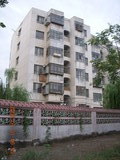
|
As a western "big-nose," as a white-skinned person with freckled arms and legs, and as a lone runner, I was clearly a novelty in this part of the world. People openly stared at me, then smiled and waved as we went by each other.
There was a van playing music and spreading paper "petals" with several cars following. Jenny told me funerals take place before sunrise and it's considered lucky to encounter one. I guess it's lucky if you're not lying in the front van.
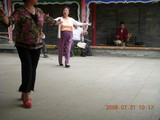
|
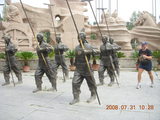
|
We went to a local park with sculpture and pools and some of their own warrior statues, metal rather than terra-cotta. One family asked if they could pose with me for pictures which I was happy to do.
There was a small group performing live, local, acoustic music. There was a singer accompanied by a few small instruments, a nice combination. It was fun to hear tones and tunes strange to my western ear.
2008 July 31 — Luminous Jade Cup Factory
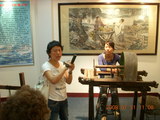
|
These were thin-wall cups carved from jade. We got to see how they were hand made and we were given ample opportunity to purchase some of these cups along with some much-more-exquisite (and much-more-expensive) jade craftsmanship.
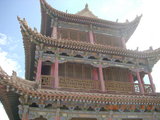
|
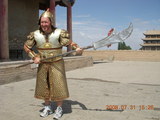
|
A trip to China has to include the Great Wall just as a trip to India has to include the Taj Mahal. Avoiding Beijing for the Olympic Games means missing the usual tourist attractions there including the dramatic east end of the Great Wall. However, one of the greatest things about the Great Wall is its great length, so we visited the west end of the Great Wall instead, 1560 Km (975 miles) from Beijing. The Wall is not just a straight line from Beijing to Jiayuguan, but this end in the Hexi corridor is the westernmost part.
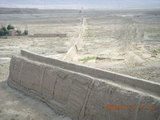
|
The farmland I ran in this morning was green fields with willow-tree-lined roadway, a product of irrigation. The brown desert out here is nearly lifeless, flat with mountains in the distance.
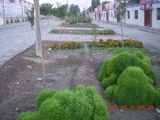
|
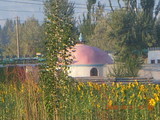
|
John Mason gave his usual terrific Explorers pre-eclipse talk, enough introduction for first timers to get a feel for what is about to happen and enough depth for veterans to get an idea of what specifically to expect this time. The topic of conversations at lunch was predictable, was the good, sunny weather going to continue for a few more hours.
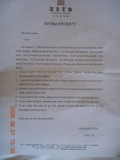
|
Jiuquan had a high probability of sunshine and promise of a minute of totality. I have to imagine that Jiuquan had lots of enthusiastic watchers as it's China's Space City, kind of like our Cape Canaveral in the United States. Our destination promised slightly higher sunshine odds and an extra fifty seconds of darkness. Was it worth two and a half hours of bus ride each way? Was it worth it even if the last hour was bumpy dirt roads? To an eclipse follower, the answer is, "Of course!"
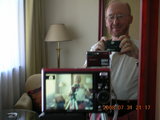
|
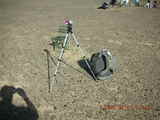
|
We were given special eclipse identification cards, stopped a few times by friendly police along the way, and given notice that we were not to use GPS to locate ourselves. The Chinese government was friendly about it with the police smiling and waving at us as we drove by.
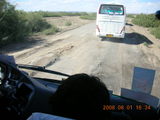
|
An total solar eclipse has four designated moments.
| First contact | is when the moon takes its first bite of sun. |
| Second contact | is when the moon completely covers the sun. |
| Third contact | is when the first bit of sun reappears. |
| Fourth contact | is when the last bit of moon obstruction ends. |
|
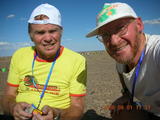
|
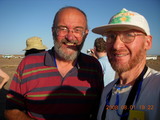
|
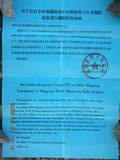
|
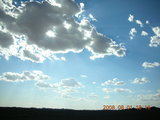
|
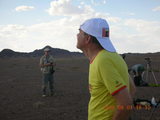
|
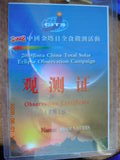
|

|
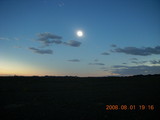
|
The corona was lovely with streamers going out on both sides, three and four o'clock on the right, nine and ten o'clock on the left. In addition, there was a particularly large, dramatic prominence (solar flare) at three o'clock on the sun's perimeter.
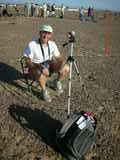
|
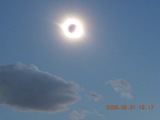
|
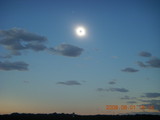
|
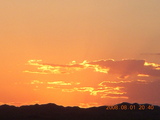
|
We were awakened in the middle of the night asking if anybody we knew was missing. Apparently the count was off by one somewhere. Nobody knew anybody was missing, the single people were all accounted for and none of the coupled people admitted to a missing partner. Say this mimicking Alfred Hitchcock: Maybe some husband or wife was trying to save the cost of a divorce.
After being awakened, I checked the computer again, "Why not?" I asked myself, and Lo and Behold the Internet worked. I let my computer spend the rest of the night sending my pictures to my home computer. I even checked my e-mail before going back to sleep.
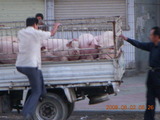
|
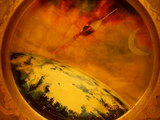
|
After awakening to a wonderful morning in China and completing my run through the countryside, I joined my hundred-plus eclipse friends for breakfast. We all wanted to tell our stories, but there really wasn't much to tell since each of our stories was the same as everybody else's stories. We all saw the same things, pretty much, so the conversations soon fell to other eclipses, other trips, other adventures, and a few stories about absent friends.
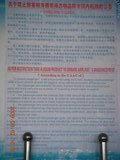
|
There's a chuckle at instructions like "Button on Left is Press," but the real insight is how different Manderin and English really are. Imagine trying to write a language you don't know from a dictionary. There are few commonalities between our talk and theirs and the results can be entertaining. I'm sure they're equally entertained when English people try to speak (or, heaven-forbid, to write) Chinese languages.
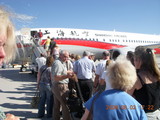
|
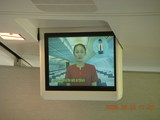
|
Morning running in Xi'an, a city of eight million people, was a contrast from the farmland of the morning before. I went along the wide sidewalks and the sort-of bicycle lanes under the centuries-old Xi'an city wall. Again, the secret of urban running is to get out early before the local traffic wakes up.
2008 August 3 — Jade Factory
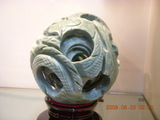
|
Among the large, fancy sculptures were the balls within balls withing balls where the inner balls (apparently) were sculpted through the holes in the outer balls. I got one of the cheap ones with three balls and left the expensive ones with five and six balls on the shelves.
We had a drive, about half an hour, into the countryside with mountains alongside the highway.
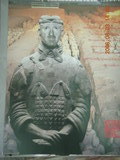
|
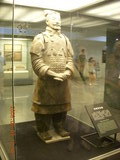
|
The Eighth Wonder of the World. That's what it said on the movie we saw before we saw the thousands of statues buried twenty-two centuries ago. The movie showed a battle where the losers were taken prisoner. Imagine what thoughts go through a prisoner-of-war, especially in ancient times where they weren't appealing to folks in The Hague for relief according to Geneva or Warsaw Conventions. Whatever is going to happen next, however long it is, the rest of your life is going to be awful. These many thousands of prisoners spent their remaining decades building thousands of clay warrior statues (with different faces, not cast from the same mold) for the tomb of a king who lived twenty more years.
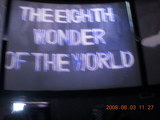
|
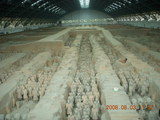
|
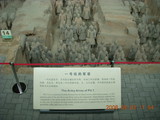
|
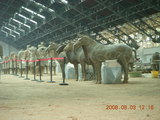
|
Pit 1 was a huge room, over a hectare, several acres worth, full of hundreds, even thousands, of grey-brown soldiers. Having somebody tell me there are 8000 life-size soldiers in a pit and seeing 3.5 acres of them are different experiences. The faces are, well, they're faces with human expressions and human features.
Pit 2 and Pit 3 are less dramatic and the museum was too crowded to see much, but the whole place was magic.
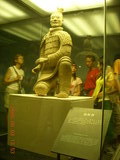
|
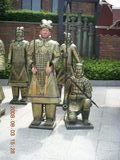
|
Lunch was impressive with a live chef making noodles. It's a noisy process, louder than pizza preparation, but worth it for the taste of fresh noodles. Some things are best fresh, pineapples and corn come to mind, and now I can add noodles to the list.
2008 August 3 — HuaQingChi Hot Springs
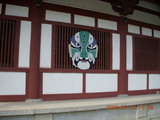
|
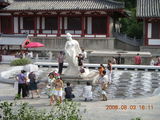
|
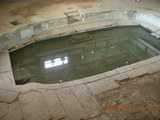
|
The hot springs were lovely with pools and baths with marble walkways and green mountain backdrop in the warm sunshine. There are worse ways to spend an afternoon.
Judith and I satiated our chocolate "jones" with ice-cream popsicles, a whole lot cheaper outside the hot springs than inside the park.
2008 August 4 - Wild Goose Pagoda
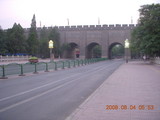
|
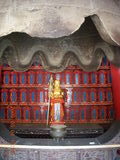
|
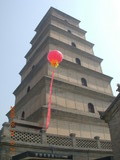
|
On our way to the airport we stopped at the Wild Goose Pagoda. They told me the pagoda was leaning like the tower in Pisa, Italy, but I didn't notice. There were the usual Chinese Buddha and lion statues and a few gargoyles like the ones we had on building corners at Princeton University.
2008 August 4 — Xi'an (XIY) to Hong Kong (HKG)
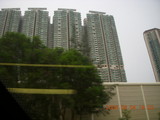
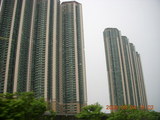
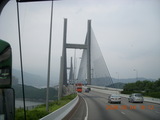
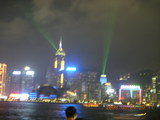
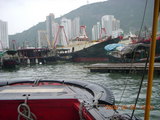
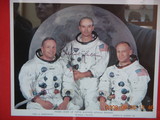
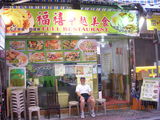
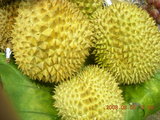
Hong Kong
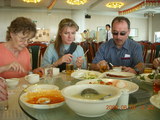
|
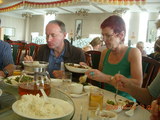
|
The flight to Hong Kong was short and pleasant, again with full meal and drink service. Funny thing, if Hong Kong is part of China, the so-called People's Republic of China, then howcum they took my Chinese exit card at the airport? Also, the visa requirements are different for mainland China and Hong Kong. Whether out of wisdom or indifference, the dragon seems to have left an island of capitalism and British influence (what a combination!) undevoured.
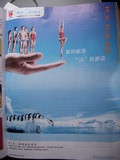
|
Like other island metropoleis, Hong Kong's shape is decidedly vertical, more than Shanghai, more than Manhattan Island in New York; City. Our hotel was the Empire Kowloon Hotel, not to be confused, we were told, with the Empire Hotel in Hong Kong itself or the Kowloon Hotel.
In deference to the bad-luck associated with the number four, I noticed the elevators had no fourth floor, or fourteenth floor either.
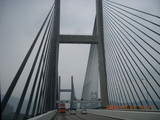
|
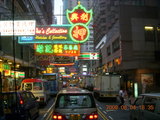
|
Some of us ambled down to the harbor view of the Hong Kong skyline just in time for "A Symphony of Lights," a laser show at 20:00 (eight o'clock in the evening). I've seen better light shows but I doubt I've ever seen bigger light shows. Seeing an entire city skyline in synchronized laser display is worth some effort.
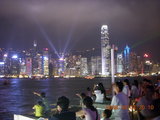
|
I went to bed after that and didn't get up until the next morning when I went for a run in the cloudy Kowloon dawn. The skyline was pretty with the tallest buildings challenging the low clouds. I ran early enough that there was little traffic, so the left-side driving was a minimal issue.
The typhoon threat was still level 1. We were told it goes on a partial-count scale, 1-3-8-9-10. 1 and 3 are okay, 8 is pretty bad, and 9 and 10 are "Watch out!" territory.

|
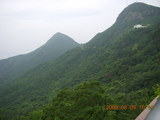
|
Our half-day tour began with a drive up Victoria Peak with Maggie, our tour guide for the morning. Our coach climbed and climbed the cloudy roadway and we got to the top where we saw a few boats in a bay. Then we walked around to the other side where we looked down on the magnificent Hong Kong skyscrapers.
2008 August 5 — Stanley Market and the Wind Surfers
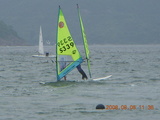
|
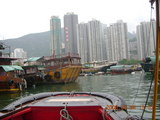
|
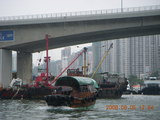
|
After over a week of tour stops, we were getting a little jaded. At least I was getting prepared for my trip home, thinking more about that than a visit to a jewelry factory. Then Maggie took us to a dock on the harbor and loaded us onto boats. A boat ride in Hong Kong Harbor was just the ticket to get us back into Hong Kong's rhythm.
We were motored around other boats, some big and some small, and near some buildings, some big and some bigger. The mix of old-fashioned boats and new-modern buildings made the ride a joy.
2008 August 5 — Jewelry Factory
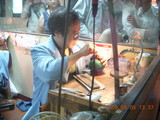
|
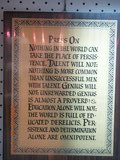
|
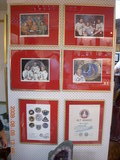
|
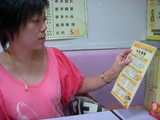
|
When I got done checking my e-mail on the hotel's computer in the bar, I noticed I had left my souvenir t-shirt in the lobby. When I asked the front-desk people, they said Maggie had my bag and she had just left. A cell-phone call connected us a few blocks from the hotel, we were both hungry, so I ended my China tour with a one-on-one meal with a terrific guide, the same way I started it. Maggie brought me to a Vietnamese restaurant where I ate a wonderful, giant bowl of Vietnamese noodle stuff.
After an afternoon of sitting around chatting our goodbyes, I bumped into my Irish-couple friends from the tour and we went to a Mongolian barbeque.
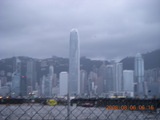
|
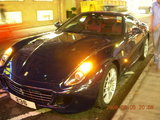
|
Sleep, my morning run, and breakfast later, I was on my way to the airport. My flight was scheduled for 11:45, quarter to noon, and the typhoon threat was up to Level 8. Things around Hong Kong were going to be closed for the bad weather anyway, so I figured I might as well wait at the airport.
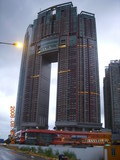
|
There were no evening Star Alliance flights back to Phoenix, so I stayed overnight at the LaQuinta Motel near San Francisco. Just to complete my computer frustration, the Internet didn't work from the hotel room, but the front desk people told me there was an outage, so it wasn't worth hassling with my computer. Again, when I woke up in the middle of the night, jet lag and all that, the Internet was working fine and I transfered the last of my digital photographs to my home computer.
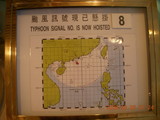
|
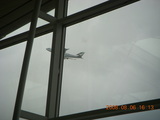
|
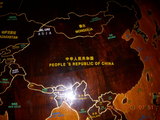
|
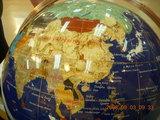
|
China's government is big and scary. Americans may criticize their elected officials in public fora, but I knew better than to ask Chinese locals what they thought of Chinese politics. Government officials were friendly and their rules were clear and consistent, at least by the standards of big bureaucracies. Still, according to our own governments and media, China's government has a lousy human-rights record.
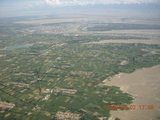
|
I don't know how to measure such things, but China is a large economy with about 1500 million people. (It's a big number that varies from 1300 million to 1600 million depending on which source the number comes from.) Never mind who are red-blooded, free-enterprise enthusiasts and who are the self-proclaimed commie pinkos, is the Chinese government really a larger part of their economy than our governments in the west? Through luck or design, they even knew enough to leave Hong Kong alone to chart its own economic, political, and social path.
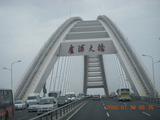
|
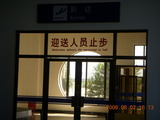
|
Isn't it funny that the country with the meanest official line might be economically the most free place on the planet?
Good Hosts versus Xenophobes
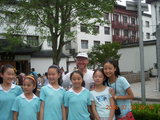
|
When we stood around doing our tourist-quality Tai Chi in the Zhu Jia Jiao fishing village, we were joined by a group of people who just wanted to be around us. Local folks wanted to have pictures taken with us. I got more smiles and waves on my morning runs than I get back home where I look like everybody else.
I don't think this graciousness is a universal trait. I certainly didn't feel welcome as a tourist in Rome, for example. I'm told the Chinese refer to a western face as "big nose," but I didn't feel the hostility that I feel when some of my countrymen refer to orientals as "slant eyes." To this tourist making his way in the land of the dragon, China felt big enough for "big noses" and "slant eyes" and a whole lot of other folks.
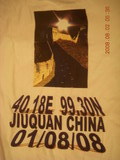
|
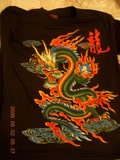
|
I came home with a bunch of small souvenirs from China. I got a silk shirt with an embroidered dragon, small terra-cotta warriors in Xi'an, fake Rolex watches, tiny luminous jade cups, and all kinds of t-shirts. At the behest of a friend, I brought back some splat pigs, toy pigs that squish flat when thrown on the floor and then regain their pig shape. Why you would want to throw a toy on the floor to squish it is something between you and your psychiatrist, but it is cool to watch it regain its pig shape afterward.
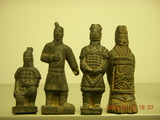
|
I came home with a lot of good feelings about China. That isn't unique or unexpected either. I developed a warm feeling about eastern Europe in my travels there during the 1990s. I enjoyed India in 1998 and 2007 and would cheerfully return. Africa is a place I would like to visit again with some supervision and planning. Finally, I'll have to find some excuse to go back to Australia. So it's no surprise that China left me wanting to return.
Plans for 2009 July 22
This time I don't need to find an excuse to return, I've already got one. 2009 July 22 is the next total solar eclipse and the path runs right through Shanghai with six minutes of totality. That's a long time for a total eclipse, near perfect conditions. Alas, Shanghai in July has cloudy skies half the time, not the brightest prospect for an eclipse, but it's worse everywhere else along the path.
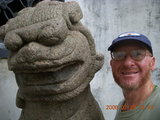
|
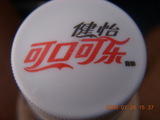
|
I look forward to going back to China. It doesn't get better than that.
|
4:18:28 Mountain Standard Time (MST). 4300 visits to this web page. |